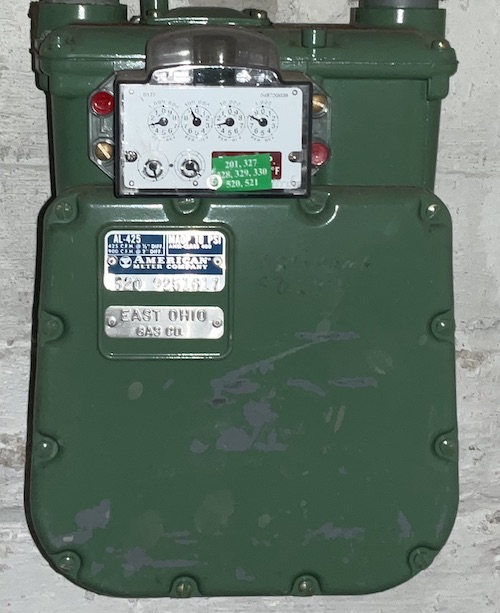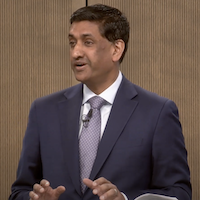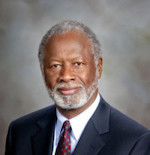
Natural gas meter on wall.
The energy company that was to receive that bulk of a corrupt $1.3 billion bailout that has already imprisoned two is telling a federal court it acted in a “legal way.” It makes that statement even though it paid at least $43 million to finance the scheme, part of which its executive chairman referred to as “black ops.”
Energy Harbor is now an independent company. But between 2017 and 2020 it was called FirstEnergy Solutions and it was a subsidiary of Akron-based FirstEnergy. That’s when FirstEnergy, former House Speaker Larry Householder, R-Glenford, and others engaged in one of the biggest bribery and money-laundering conspiracies in Ohio history.
Two nuclear plants owned by FirstEnergy Solutions were losing money and FirstEnergy’s top leadership wanted a ratepayer bailout to prop them up so they could send the subsidiary through bankruptcy, spin it off and get the nuclear plants’ financial and environmental liabilities off of FirstEnergy’s books.
The energy company and its subsidiary paid more than $60 million to make Householder speaker, pass the bailout and defend it from a voter-initiated repeal. It all blew up in July 2020 when federal law enforcement charged Householder and four others with racketeering for their roles in the scheme.
Householder is now serving a 20-year prison sentence and FirstEnergy admitted wrongdoing in a deferred-prosecution agreement and paid a $230 million fine. Energy Harbor, the company FirstEnergy Solutions became when it emerged from bankruptcy in early 2020, hasn’t been charged.
But federal prosecutors are continuing their probe, with Sam Randazzo, the former chairman of the Public Utilities Commission of Ohio, being indicted only weeks ago.
In addition, a group of large investors such as pension funds are suing FirstEnergy in civil court claiming securities fraud. As a part of that case, lawyers for the investors are seeking communications between executives with what was then FirstEnergy Solutions and their attorneys as the bribery conspiracy was taking place.
Normally, such communications can be kept secret under the doctrine of attorney-client privilege. But the plaintiffs in the civil case are seeking to pierce that privilege under the “crime-fraud exception.” In other words, they’re claiming that the lawyer-client communications were the part of actions which on their face could be seen as criminal activity.
A special master handling evidentiary disputes in the massive civil case ruled that the crime-fraud exception applies, so the company that used to be known as FirstEnergy Solution has to turn over thousands of attorney-client communications. The company, now known as Energy Harbor, has appealed, arguing that it shouldn’t have to.
“In short, the evidence shows that Energy Harbor prudently and properly consulted with its lawyers to determine how to make contributions and advocate for legislation in a legal way, not to help it commit a crime,” the company said in a Dec. 11 court filing. “There is no evidence from which the Special Master could reasonably infer that Energy Harbor’s communications with its lawyers were intended to facilitate or conceal a crime or fraud.”
However, lawyers for the plaintiffs said, that ignores several important facts.
For one, the company’s lobbyist, Juan Cespedes, has pleaded guilty in the conspiracy. In court in early 2023, he admitted to corruptly steering a mountain of cash from FirstEnergy Solutions into a 501(c)(4) “dark money” group to finance the bailout conspiracy. Cespedes testified that conspirators funneled cash through the dark money group to conceal its source as it was used for an illegal purpose.
He started by describing contributions of $500,000 and $15 million he directed to the dark money group.
“After that, I again coordinated in the amount of over $35 million, contributions from (FirstEnergy Solutions), my client, to (the dark money group), which was a (c)(4) again controlled by Jeff Longstreth (who also pleaded guilty) and Mr. Householder, all for the purpose of defending our legislation and protecting some of the representatives who we cared about at the time,” Cespedes testified.
Lawyers for the plaintiff investors argue that lawyers for FirstEnergy Solutions gave legal advice about contributions that the company’s lobbyist has admitted are illegal, so that advice is subject to the crime-fraud exception.
The plaintiffs’ lawyers also noted how FirstEnergy Solutions lawyers reviewed drafts of the bailout legislation.
Randazzo, who is charged with taking a $4.3 million bribe from FirstEnergy, and a recent PUCO employee worked on drafts of the bill even though Randazzo was supposed to be regulating its beneficiary. Cespedes, the lobbyist, shuttled printed copies of the drafts between the employee — who then worked for Householder — and attorneys for FirstEnergy Solutions. The use of printed drafts seems to have been intended to avoid creating an electronic trail, which might indicate a knowledge that the conduct wasn’t legal.
In addition, attorneys for the former FirstEnergy Solutions are describing as innocent the company’s participation in a xenophobic campaign to stop a voter attempt to repeal the corrupt bailout.
“Energy Harbor contributed to (the dark money group), after consulting with lawyers, with the clear understanding that the funds would be used for a media campaign in support of H.B. 6 and, later, to defeat the referendum,” they told the court in the civil case.
However, the attempt to defeat the referendum involved a flood of commercials falsely claiming that it was really an attempt by China to take over the Ohio power grid. The fight against the repeal also featured thuggish harassment of people trying to circulate petitions that at times turned violent, witnesses testified during Householder’s trial.
John Kiani was FirstEnergy Solutions’ executive chairman through the bailout and he continues in that post now that the company is named Energy Harbor. During Householder’s trial, Cespedes testified that a Kiani aide told himthat Kiani would make $100 million from the sale of FirstEnergy Solutions’ nuclear plants.
Based on Kiani’s communications during the failed repeal attempt, it would appear the executive chairman didn’t think the fight against it was completely above-board, despite what the company’s lawyers are arguing now.
“What happened to the black ops?” Kiani texted at the height of the repeal fight to former Ohio GOP Chairman Matt Borges, who is serving five years in federal prison for his role in the scandal. Cespedes testified Kiani’s statement was a reference to Cespedes’s attempt to spy on the repeal effort by paying an insider funds from the FirstEnergy entities.
• • •• • •
This story is provided by Ohio Capital Journal, a part of States Newsroom, a national 501 (c)(3) nonprofit. See the original story here.














